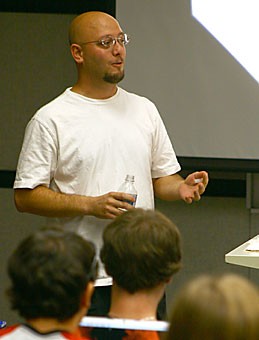Paul Blowers, associate professor of chemical and environmental engineering, teaches Engineering 196 – a first-year course geared toward helping students transition smoothly into college. Throughout the course, students engage in unique activities such as composing resumes and finding cool spots to hang out in Tucson. Blowers sat down to explain how he began teaching this class, what he hopes his students will aspire to and how he’s managing his time with the upcoming birth of his daughter.
Wildcat: How did Engineering 196 get started?
Blowers: When I was asked to take over the class, I asked, ‘What are the parameters?’ The academic dean said I could do whatever I wanted. So that’s when I came up with the idea of sharing all the things I wish had been shared with me when I was an early undergraduate to help my transition to college go smoother and my development as a professional go smoother.
Wildcat: What’s the most unique aspect of your class?
Blowers: One is that it’s almost totally discussion-driven. Lecturing isn’t that interesting. Second is that it’s stuff that is integral to surviving college but really is never taught anywhere else. I teach students how to write a good resume. I have them plot their day in half-hour increments and then turn it into a pie chart. If they’re spending 30 hours a week volunteering, they can see how much of the pie that takes up and that they need to restructure their time. I teach them how to maximize taking tests even if they don’t know the answers. It’s about empowerment, and none of this is involved in any other class. It’s about trying to get students to realize where they’ll be in 10 years.
Wildcat: What feedback have you received from students?
Blowers: Everything from students coming to me and saying, ‘My brother took your class seven years ago and said I need to be in it,’ to students coming back to me four years later when they’re seniors and saying ‘You know when we did resumes? I still use what we learned as the basis for my current resume.’
Wildcat: Where do you encourage students to go for additional help?
Blowers: Whoever is best at the university for whatever their problem is. I try to find one good person in each office, and that goes in my (mental) data bank to use in the future.
Wildcat: What do you enjoy most about working with students?
Blowers: Seeing the continual professional and intellectual development that students are constantly undergoing.
Wildcat: What is the toughest part of your job?
Blowers: The toughest part is continually striking a balance between being there for my family, being there for my students, accomplishing my research goals, raising grant money, taking care of my service activities and doing all of that without cutting corners. My daughter is due in 11 days, as well.
Wildcat: If you could offer students one piece of advice, what would it be?
Blowers: You are in charge of where you’re going. People can give you advice and you should seek it, but in the end you’re the one who gets to make all those decisions. And you’re responsible for your failure or your success.









